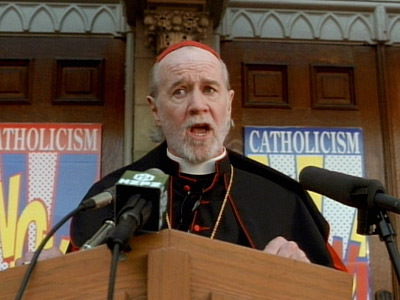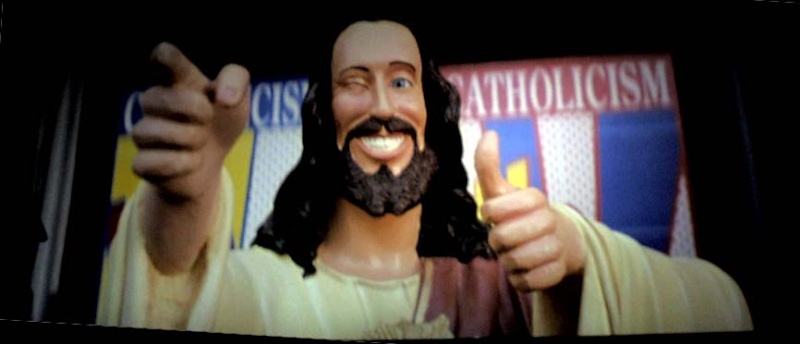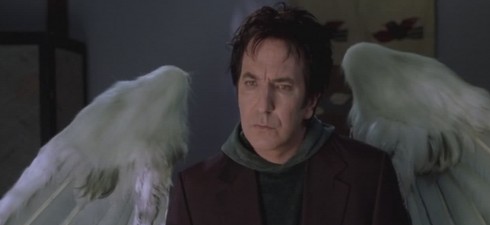When Dogma (1999) was first released, it was met with all the usual protestors: the Harry-Potter-book-burners, who hadn’t bothered to see the film. From a copy of the script, the Catholic League were left with no doubt that this was a ‘blasphemous’ film: casting Alanis Morissette as God, and Chris Rock as the uncensorable thirteenth apostle. When interviewed for Time Magazine, Kevin Smith, the director and writer, hit back: “I’m hoping that when people see the film, they’ll say, ‘Oh, it’s not the movie that flips the bird at the church. It’s actually kind of devout.'” Indeed, Smith has claimed that his Catholic upbringing is still strong with him, and that he attends Mass on the day before production of a film, and the day it premieres.
 Smith had obviously built up a fair amount of pressure in his boiler about his native religion, and Dogma seems to be the vehicle he chose to release it: in one Almighty cinematic beef-dump. The stars were on hand to help out: and there are some decent performances. I can’t fault George Carlin for his hammy portrayal of a Catholic Cardinal, and Chris Rock is actually pretty fun to watch, doing his Chris Rock thing. Once you get past the all-too-brief reprieves from the stand-up comedians, however, you’re left with almost two hours of movie that are pretty hard to watch. And I very rarely watch movies that I find it hard to sit through. Linda Fiorentino (Bethany) is so hammy it’s painful, and Ben Affleck is even worse than Matt Damon. In the Team America sense.
Smith had obviously built up a fair amount of pressure in his boiler about his native religion, and Dogma seems to be the vehicle he chose to release it: in one Almighty cinematic beef-dump. The stars were on hand to help out: and there are some decent performances. I can’t fault George Carlin for his hammy portrayal of a Catholic Cardinal, and Chris Rock is actually pretty fun to watch, doing his Chris Rock thing. Once you get past the all-too-brief reprieves from the stand-up comedians, however, you’re left with almost two hours of movie that are pretty hard to watch. And I very rarely watch movies that I find it hard to sit through. Linda Fiorentino (Bethany) is so hammy it’s painful, and Ben Affleck is even worse than Matt Damon. In the Team America sense.
Here’s the problem, I think. Dogma seeks to follow in the footsteps of the very venerable tradition of the political/religious standup comedy show, which has been so successful for George Carlin, Bill Hicks, and Bill Maher. And I like those guys, and can watch a full show of Tim Minchin with glee (and he’s Australian: it’s not all dominated by the Home of the Brave). But when Smith tries to translate this formula into a plot, with as many big-name actors as he’s signed up (to bring in the audiences), he loses the personality — the ego – of these great comedy shows, and has to resort to alternating between two kinds of content: the B-movie shtick and the theological rant. The two don’t go together too well, either. Not like this.
It begins from the outset. Matt Damon’s character – a former angel of death called ‘Loki’ — is ‘opening the eyes’ of a middle-aged nun to the true nature of religion as a fraud, which results in her seeing the light, and realising that she’s been wasting her life. They get less funny from there-on in. I suppose Smith is hoping that meek, moderate cinemagoers are going to sit through two hours of these tracts, and have the magical seed of free-thinking planted in their brains too. However, I know that — at least for Mormons — this doesn’t seem to happen. For example, my wife Helen went to see the movie with her brother and a whole group of Young Adults when it first came out, and walked away feeling that although Catholicism was surely rotten right through, the LDS Church was even more precious as the last bastion of true religion. (If you’ve had a different experience, please let us know below!) My suspicion is that if you’re an orthodox believer, you won’t absorb the darts of dissenting thought, and if you’re a recently disaffected believer/angry post-Whatever, you’ll cheer on every sucker-punch. For everyone else: these are the same old arguments, and I for one, am pretty bored of hearing them.
The other side of the pancake is the B-movie, another venerable tradition that I’m a huge fan of. Yet, Dogma disappoints here, too. Sure, we get the juvenile over-sexualisation of everything from Silent Bob’s partner Jay, head-exploding gore and an attack from a giant-sized shit monster: but the first commandment of B-movies must be to ‘Not take thyself too seriously’. And despite the over-lengthy title disclaimers, this film surely has too lofty a goal to be an enjoyable B-movie. It’s also too polished (but not polished enough for Hollywood-lovers), has too many big-name actors, with too many soliloquies.
In the end, though: I’ve got to give a high five to Smith for giving the ‘anti-dogma movie’ a shot. As Alan Rickman’s character Metatron (the voice of God) says: “You people! If it’s not in a Charlton Heston movie, it’s not worth knowing, is it?” Cinema will (and does) provide the answers Smith is reaching for: they just don’t involve ‘Buddy Christ’.

NEXT WEEK: ‘Rogue Cinema’ will be on a TUESDAY, for one week only. We’re staying in 1999 for another end-of-the-Millennium film: Paul Thomas Anderson’s Magnolia. For our schedule, check in here.

Smith’s dialogue is overwritten and self-conscious; I think this is less a desire to ape comedians and more an inability to write the way people actually talk, subtlety is not his strongsuit. :) Tarantino is right on the edge of this sometimes, but he has a better feel for the musicality of language and he is gifted at getting very naturalistic performances from his actors that work with the stylized diaglogue rather than against it. Smith is also overly fond of juvenile humor and his movies look like crap (I don’t need things to be Hollywood glossy, but his films are a mess), but I can’t help liking Smith and “Dogma.” I admire his ambition, sincerity, irreverence and the desire to write about big topics (even if he can’t quite keep it togther).
The thing about Tarantino’s dialogue for me is that it’s much truer to the tradition of films it references. Smith has just set himself a pretty awesome task… I too admire his ambition. And you can’t fault the irreverence… :)
Can you think of other postmodern narrative fictional films that try to do what Smith is aiming at, Heidi? I wonder whether it’s just an impossible thing to do with our contemporary psychology. The nearest you can really get to it, perhaps, is Maher’s Religulous. Which I liked: but it didn’t try to be a ‘story’.
Smith’s dialogue can be a bit heavy. “Dogma” is the film Smith always wanted to make and he can credit his success with “Clerks” for making it possible for him to make it. Strangely enough, my favorite scenes from “Dogma” were actually cut from the theatrical release. The first is a monologue by Linda Fiorentino’s character Bethany describing her experience getting an abortion and the aftermath of the experience and the second is another monologue by Jason Lee’s character Azrael describing the nature of Hell. An excerpt: “Well, Lucifer just had to start his little war for the throne. Heaven became divided into two factions, the faithful and the renegades. Oh the ethereal plains were chaotic with battle. Angel against angel. And when it was all over, God cast the rebels into perdition… Human, have you ever been to Hell? I think not. Did you know that once Hell was nothing more than the absence of God? And if you’d ever been in his presence, then you’d realize that’s punishment enough. But then your kind came along and made it so much worse… Evil…is an ABSTRACT! It’s a human construct! But, true to his irresponsible nature, man won’t own up to being its engineer so he blames his dark deeds on my ilk. But his selfishness is limitless and it’s not enough to shadow his own existence. No. He turned Hell into a suffering pit. Fire! Wailing! Darkness! The kind of place anyone would do anything to get out of. And why? Because he lacks the ability to forgive himself. It is beyond your abilities to simply make personal recompense for the sins you commit. No, you choose rather to create a psychodrama and dwell in a fallous belief that God could never forgive your grievous offenses. So you bring your guilt and your inner decay with you to Hell. Where the horrid imaginations of so many gluttons for punishment gave birth to the sickness that has infected the abyss since the first one of your kind arrived there begging to be punished. And in doing so, they’ve transformed the cold and solitude to pain and misery. I spent eons privy to the flames, inhaling the decay, hearing the wail of the damned. I know what effect such horrors have on the delicate psyche of an angelic being. Would you like to glimpse pain eternal? I’d rather not exist than go back to that? And if everyone has to go down with me, so be it!”
Simply wish to say your article is as astounding. The clarity in your submit is simply nice and that i could think you’re knowledgeable in this subject. Well along with your permission allow me to take hold of your RSS feed to keep updated with coming near near post. Thanks one million and please keep up the enjoyable work.